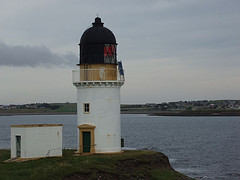Well, the local Health Board, eh? That is a cesspit, no mistake.
The Lighthouse blog features quite a few entries on it, and reactions on it have been increasing hostile. The very first entry on the subject, dating back to last December, gives a flavour of what is (allegedly LOLOL) going on.
The issue of service reforms in the NHS in the Western Isles has dominated the news over the past few weeks. Without boring readers to tears, there are a few issues that influence the NHS in the Western Isles. First of all, only 26,500 people live between Ness and Mingulay. There has to be a fully equipped health service on the islands, in order to cope with any immediate emergency. We have a largish hospital in Stornoway, a medium sized one on Benbecula and a small unit in Barra.
It is common practice for complicated cases to be flown out to major centres like Inverness and Glasgow. Health professionals, such as doctors, have to maintain and expand their skills, and to that end usually rotate through different hospitals over a period of years. Because complicated cases are not normally treated at Stornoway (or Benbecula or Barra), there is little professional incentive for doctors to come here. In other words, it is desperately difficult to attract professional staff. The same applies to other health professionals, like nurses.
The Health Board has therefore been forced to get the necessary staff in as locums. These can cost as much as £70 an hour, and if they are on call (i.e. available to work, but not necessarily on the job), that can mount up.
At the moment, there is a vacancy for a psychiatrist after the previous consultant retired on December 6th. He announced his retirement in July, but the Board never took action until much later than that. The result is that no-one has as yet been found to replace the consultant in question, and another locum is probably going to be employed. At a considerable cost.
So, the NHS Board in the Western Isles decided on service reform to address this problem. In consultation with staff, the Board reached the conclusion that closing a ward, to release nurses for duties elsewhere in the NHS (not necessarily in hospital), would be a good idea. And that skills and responsibilities would be shared out to lower grades of professional staff than before. Training would be provided where necessary. An example: a general surgeon can be expected to perform a caesarian section. Psychiatric emergencies are expected to be dealt with (out of hours) by a community psychiatric nurse and a GP. Still with me?
Second problem is a serious breakdown in communication between management and staff. Allegations of bullying and harassment have been flying around, and are currently being investigated. People felt so intimidated and brow-beaten that they did not feel able to speak to their manager about any concerns or misgivings regarding the current round of reorganisations. They felt able to speak to anyone, apart from the management of NHS Western Isles. As a result, local councillors organised a meeting on November 30 for staff to air their grievances. And air they did. It was a damning indictment of the Health Board, which has been widely reported in the press. The Health Board itself put its case to the public the next day. When the opportunity arose for questions, several people voiced their concerns over service cuts and the problem of staff morale. The Chief Executive himself did not acknowledge or respond to the criticism - he mutely passed it on to one of his medical directors to answer. It was this same Medical Director who has gone on record today (16th December) as saying that any more criticism of the health board may well lead to its abolition. In other words, criticism is not allowed. That is also bullying. The Scottish Health Minister, Andy Kerr, has said that he is not interested in the bullying allegations. Whilst these in themselves may justly be seen as a purely internal matter, they very seriously undermine the credibility of the health board when it states that the proposed service changes were made in proper consultation with staff. It is speaking volumes that grievances can only be aired in public meetings, at the instigation of local councillors. Under normal circumstances, this should be thrashed out internally without the need to hang out all the dirty washing.
The third problem that surfaced were the facilities offered to Health Board managers not to have to live in the islands, but being able to commute from and to the mainland at the tax payers' expense. They were held not to contribute to the island's economy in a direct sense. Unfortunately, it would appear that (unlike e.g. elected representatives, such as councillors) Health Board managers are appointed, and are not accountable to the public they serve.
The hospital in Stornoway has always been 'of the people', built with the money of the people of Lewis and Harris. People are very proud of their hospital, and feel strongly about cutbacks in services.
To me, as onlooker, this smacks of an old attitude that used to be around in these islands. It reminds me of "A Shilling for your Scowl" i.e. do not criticise the man in the Big House - Laird knows best. It is an attitude I've never understood, yet it does keep rearing its ugly head.
I thought we had gone into the 21st century, not still stuck in the 19th.












Wow they run things a bit differently there than they do here. We still have our problems here though, for sure!
ReplyDeletePamela